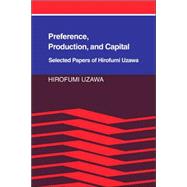
Note: Supplemental materials are not guaranteed with Rental or Used book purchases.
Purchase Benefits
What is included with this book?
| Foreword | |
| Preface | |
| Part I. Preference and Demand: 1. Preference and rational choice in the theory of consumption | |
| 2. On the integrability of demand functions | |
| 3. Time preference, the consumption function, and optimum asset holdings | |
| Part II. Duality and Production: 4. Duality principles in the theory of cost and production | |
| 5. Production functions with constant elasticities of substitution | |
| 6. Neutral inventions and the stability of growth equilibrium | |
| 7. Optimum technical change in an aggregative model of economic growth | |
| Part III. Concave Programming: 8. The Kuhn-Tucker theorem in concave programming | |
| 9. Iterative methods for concave programming | |
| 10. Prices of the factors of production in international trade | |
| Part IV. Equilibrium and Stability: 11. Walras's existence theorem and Brouwer's fixed-point theorem | |
| 12. On the stability of Edgeworth's barter process | |
| Part V. Theory of Economic Growth: 13. On a two-sector model of economic growth, I | |
| 14. On a two-sector model of economic growth, II | |
| 15. Time preference and the Penrose effect in a two-class model of economic growth | |
| 16. On the dynamic stability of economic growth: the neoclassical versus Keynesian approaches | |
| Part VI. Optimum Growth: 17. Optimal growth in a two-sector model of capital accumulation | |
| 18. Optimum fiscal policy in an aggregative model of economic growth | |
| 19. On the economics of social overhead capital | |
| Index. |
The New copy of this book will include any supplemental materials advertised. Please check the title of the book to determine if it should include any access cards, study guides, lab manuals, CDs, etc.
The Used, Rental and eBook copies of this book are not guaranteed to include any supplemental materials. Typically, only the book itself is included. This is true even if the title states it includes any access cards, study guides, lab manuals, CDs, etc.